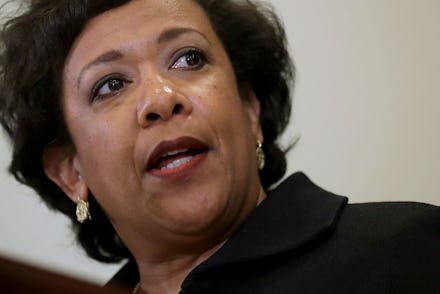Loretta Lynch says Trump, Sessions present "challenging times" for civil rights in the US

NEW YORK CITY — Former U.S. Attorney General Loretta Lynch said Monday she has been disappointed in early action taken by the Trump administration that rolled back protections for the LGBTQ community and threatened immigrant families.
"I think some of the biggest disappointments for me have been this administration's change in how they're dealing with transgender issues," Lynch said during a discussion event titled "The Future of Race + Inequality in the United States" at New York University School of Law. She was referring to her successor's Feb. 22 decision to rescind an Obama administration memo asking public school officials to ensure transgender students had access to bathrooms matching their gender identity.
"We are definitely in challenging times. We're definitely in difficult times," Lynch said. "A lot of the things that so many of us have fought for are being deliberately and actively rolled back, pushed back and trampled on. How the law is managed is very, very much on whose hands that it's in."
The Trump administration's rollout of an executive order targeting Muslim immigrants and their view that certain LGBTQ rights should be left up to the states, has troubled civil rights advocates and legal scholars. But President Donald Trump's appointment of Jeff Sessions to attorney general, and his Senate confirmation despite questions about his anti-civil rights record and allegations of racial insensitiveness, is not a death knell for freedom in the nation, Lynch said. The communities that feel targeted must do more to tap into and empower leaders who reflect their values, she said.
"Politics is about more than about who the president is," Lynch said. "Law enforcement is more than about who the attorney general is. You can, in fact, make change at the local level. If we want to rebuild to a point that we do have a federal government that is responsive to our needs, and that does listen to people, and that is based on inclusion as opposed to fear and exclusion, we have to populate it with people who hold those values dear."
Lynch is the first black woman to serve as attorney general, from 2015 through 2016, when cases of police brutality and injustice raised by the Black Lives Matter movement dominated the national discussions of race. Under her charge, the U.S. Department of Justice investigated rampant abuse in local police departments, most notably in the Chicago and Baltimore following officer-involved deaths of Laquan McDonald and Freddie Gray. Under Sessions, rigorous pursuits of fairness in policing, among other civil rights issues, is less likely, the former attorney general said Monday.
"There will likely not be the pattern-or-practice case that we saw over the last eight years," Lynch said. "But the lessons learned from those cases are tremendous."
The event, which launched NYU's Center on Race, Inequality and the Law, also featured Sherrilyn Ifill, president and director-counsel of the NAACP Legal Defense and Educational Fund; and Bryan Stevenson, executive director of Equal Justice Initiative, an Alabama-based racial injustice watchdog.
Stevenson, who is also a clinical law professor at the NYU law school, said activists and civil rights lawyers need to do more to create a climate in which racism, xenophobia and discrimination have real consequences for government officials "I think we have to create tension," he said.
To Stevenson's point, the Trump administration's executive order on immigration barring entry for travelers from seven Muslim-majority nations is proof more work needed to be done to combat hateful policies, Ifill said. "We know who Jeff Sessions is. This is kind of what you expect," she said. "And nevertheless, it does take your breath away."
Tony Thompson, the director of the Center on Race, Inequality and the Law, who moderated the discussion, concluded the panel by asking Lynch and her co-panelists to offer advice to aspiring civil rights lawyers at the law school.
"I still have a sliver of hope," Lynch said. "These are difficult times. You're going to see some things and hear some things that are going to shock you. I think you've seen them already. They're going to make you wonder, 'What has America chosen and why?'
"The times that we are in and are about the transition to through will highlight for you what's important to you. It's going to be painful to get there, but it always has been."